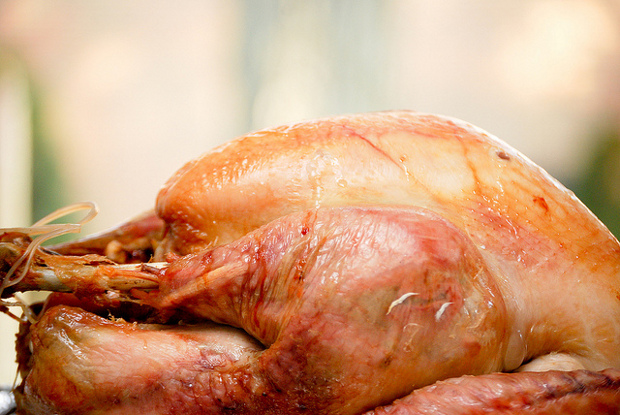It’s probably too late to get a Kentucky farmed, pasture raised turkey from someone like Marksbury Farm Market, but keep them in mind before you get your Christmas turkey or ham. It’s good to know that in Lexington we have local options to the factory raised meat, especially after reading articles like the one below.
article via Food Renegade
Want Some Turkey With Your Salt Water?
In a day and age when industrial food manufacturers bring us 100% orange juice that’s not really 100% juice, or shredded cheese packed with wood pulp, is it any surprise that when you pay $4.99/lb for a supermarket turkey (even an “organic” one), you’re actually buying a “bird” that’s typically 40% salt water?
Brined turkey has something going for it — built-in grace. Accidentally leave your bird in the oven for a half hour too long? It’s okay! A brined turkey will still be moist and tender.
But that doesn’t mean the food manufacturers have your best cooking interests in mind when they sell you a brined bird. Nah. They’re just adding weight. After all, who in their right mind would want to pay extra for salt water and wind up with far less meat than they bargained for? If your store-bought turkey is labeled “enhanced” or “flavor enhanced” or “self-basting” or “basted,” it has been injected with a salt water solution during the packaging process. Often, this solution contains nasty additives like vegetable oils and emulsifiers.
While U.S. law does require that these “enhanced” meats be labeled, the labels are often inconspicuous and hard to find. The USDA has recently proposed new rules that require these labels to be more prominent and explicit, but as of yet this is not the law of the land. As it stands, the labeling may be hidden near the Nutrition Facts or ingredient labels, may be small enough to hide in plain sight, and may not fully list the ingredients in the brining solution.
According to Mother Earth News, “Organic” poultry is no exception:
Organic regulations don’t prohibit injection, which is standard procedure for processing meats like hams, but the ingredients in the brine are restricted.
Even raw poultry labeled as “natural” can include these suspect brining solutions:
All raw single ingredient meat and poultry qualify as “natural.” However, certain products labeled as natural may also contain a flavoring solution provided the solution contains ingredients that are minimally processed and not artificial; e.g., natural flavoring. The amount of solution added to products bearing natural claims is not limited. (source)
In other words, you could be buying a certified organic, all-natural turkey at Whole Foods, and it could be up to 40% solution and only 60% turkey!
In theory, I wouldn’t object to buying a brined bird so long as two conditions were met: 1) that the brine ingredients be clearly labeled as something I would concoct in my own kitchen, and 2) that the price were reduced accordingly. I see no reason to pay a premium price for salt, water, and herbs.
But, of course, that’s not what happens! Instead, innocent shoppers are hoodwinked into buying less meat for more money, all in the name of having a moist, self-basting turkey for the holidays.
So, what can you do?
First, stick to buying holiday turkeys and hams from farmers you know and trust. (Isn’t that my go-to solution for all things food-related?) Your meat will be more nutritious and flavorful. You may even find a heritage breed to buy and enjoy.
Second, look carefully at the entire label and avoid buying any turkey or ham that’s labeled “enhanced” or “flavor enhanced” or “self-basting” or “basted.” No reason to pay too much money!
And finally, brine your turkey yourself! If you’ve bought a pastured hen, this is almost guaranteed to be a necessity. Pastured poultry tends to be more dry than conventional poultry unless you know how to cook it right. John Moody of the newly-created Food Clubs & Co-Ops site has a nice tutorial on how to brine your turkey.


